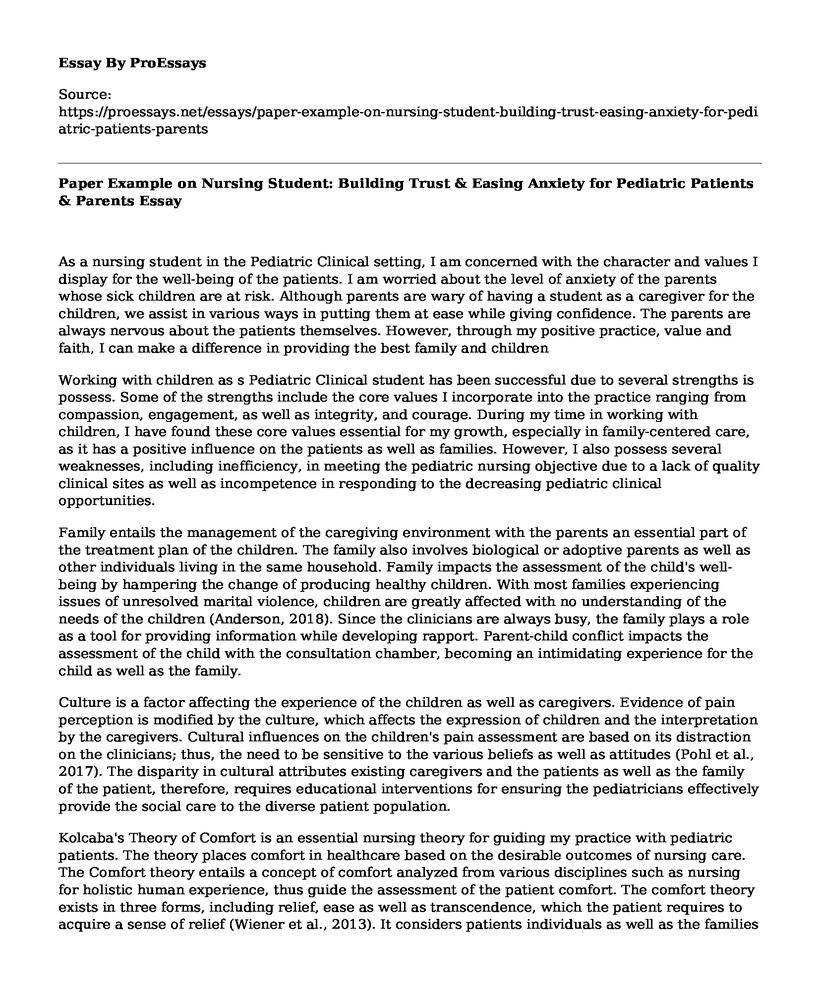As a nursing student in the Pediatric Clinical setting, I am concerned with the character and values I display for the well-being of the patients. I am worried about the level of anxiety of the parents whose sick children are at risk. Although parents are wary of having a student as a caregiver for the children, we assist in various ways in putting them at ease while giving confidence. The parents are always nervous about the patients themselves. However, through my positive practice, value and faith, I can make a difference in providing the best family and children
Working with children as s Pediatric Clinical student has been successful due to several strengths is possess. Some of the strengths include the core values I incorporate into the practice ranging from compassion, engagement, as well as integrity, and courage. During my time in working with children, I have found these core values essential for my growth, especially in family-centered care, as it has a positive influence on the patients as well as families. However, I also possess several weaknesses, including inefficiency, in meeting the pediatric nursing objective due to a lack of quality clinical sites as well as incompetence in responding to the decreasing pediatric clinical opportunities.
Family entails the management of the caregiving environment with the parents an essential part of the treatment plan of the children. The family also involves biological or adoptive parents as well as other individuals living in the same household. Family impacts the assessment of the child's well-being by hampering the change of producing healthy children. With most families experiencing issues of unresolved marital violence, children are greatly affected with no understanding of the needs of the children (Anderson, 2018). Since the clinicians are always busy, the family plays a role as a tool for providing information while developing rapport. Parent-child conflict impacts the assessment of the child with the consultation chamber, becoming an intimidating experience for the child as well as the family.
Culture is a factor affecting the experience of the children as well as caregivers. Evidence of pain perception is modified by the culture, which affects the expression of children and the interpretation by the caregivers. Cultural influences on the children's pain assessment are based on its distraction on the clinicians; thus, the need to be sensitive to the various beliefs as well as attitudes (Pohl et al., 2017). The disparity in cultural attributes existing caregivers and the patients as well as the family of the patient, therefore, requires educational interventions for ensuring the pediatricians effectively provide the social care to the diverse patient population.
Kolcaba's Theory of Comfort is an essential nursing theory for guiding my practice with pediatric patients. The theory places comfort in healthcare based on the desirable outcomes of nursing care. The Comfort theory entails a concept of comfort analyzed from various disciplines such as nursing for holistic human experience, thus guide the assessment of the patient comfort. The comfort theory exists in three forms, including relief, ease as well as transcendence, which the patient requires to acquire a sense of relief (Wiener et al., 2013). It considers patients individuals as well as the families for effective health care with the definition of various elements of nursing practice setting, including the financial situations and social support.
From my strengths, weaknesses as well as the theory of nursing practice, the goals and objectives for the Practicum experience in this course should include attaining optimal physical, mental as well as social well-being of the children, provision of effective pediatric services, conducting child advocacy as well as health policy. The Practicum experience should aim at providing appropriate care for patients with different life experiences, beliefs, as well as notions of healthcare. It should also explore culture as well as religion information to shape the pediatric care.
A timeline of Practicum activities from my practicum requirements entails:
- January to February: searching for the practicum opportunity
- February to March: providing the local organization with the practicum information while discussing the potential for the project.
- April: Practicum plan approval
- May: Receive approval for the practicum project
- June: Register the practicum project
- July: Complete the project.
References
Anderson, J. (2018). The Impact of Family Structure on the Health of Children: Effects of Divorce. The Linacre Quarterly, 81(4), 378-387. https://doi.org/10.1179/0024363914Z.00000000087
Pohl, C., Jarvill, M., Akman, O., & Clark, S. (2017). Adapting Pediatric Clinical Experiences to a Changing Health Care Environment. Nurse Educator, 42(2), 105-108. https://doi.org/10.1097/NNE.0000000000000315
Wiener, L., McConnell, D. G., Latella, L., & Ludi, E. (2013). Cultural and religious considerations in pediatric palliative care. Palliative and Supportive Care, 11(1), 47-67. https://doi.org/10.1017/S1478951511001027
Cite this page
Paper Example on Nursing Student: Building Trust & Easing Anxiety for Pediatric Patients & Parents. (2023, Apr 09). Retrieved from https://proessays.net/essays/paper-example-on-nursing-student-building-trust-easing-anxiety-for-pediatric-patients-parents
If you are the original author of this essay and no longer wish to have it published on the ProEssays website, please click below to request its removal:
- Course Work Example: Social Work with Volunteer Family
- Legal and Ethical Application of Differentiated Essential Competencies (DECs)
- Research Paper on Working With Students with Mild/Moderate Disabilities
- Research Paper on Ebola Disease
- Legislation Testimony of Affordable Care Act Essay Example
- Essay on System Lifecycle in Healthcare Tech: Design, Operate, Maintain
- Stress: A Complex Physical Process Affecting Our Mental and Physical Health - Essay Sample







